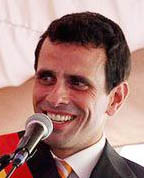CARACAS, (Reuters) – Venezuela’s election commission is investigating both sides in this year’s bitterly contested presidential race over alleged campaign irregularities, a mere two months before voters head to the polls in the South American OPEC nation.

President Hugo Chavez is squaring off against youthful opposition candidate Henrique Capriles in an Oct. 7 vote that has become the controversial socialist leader’s toughest political battle of his 14 years in power.
With both camps leveling accusations of foul play, all eyes are on the National Electoral Council, which said late on Thursday it was investigating state TV channel VTV, government-run newspaper Correo del Orinoco, and the opposition campaign.
It said VTV had allegedly paid for election propaganda, while the Correo del Orinoco used the image of an opposition candidate without permission in a negative ad.
It also cited the opposition for allegedly exceeding the limits on television and print commercials, and added that it would consider whether Capriles was breaking any rules by regularly donning a baseball cap featuring the Venezuelan flag.
If either side is found guilty of an infraction, they could be fined.
In the lead up to the vote, pressure is growing on the Electoral Council to take stronger action to ensure a balanced campaign. Chavez has also called on state media to abide by electoral rules.
After the announcement, the two sides traded barbs.
“You have to listen to the umpire. If the umpire tells you, ‘Look Chavez is crowding the plate, step away from home plate’, I can say I’m okay and he can say no, move back.
You have to move back,” Chavez, an ardent baseball fan, said on Friday.
In a message on Twitter after the council’s decision, his rival Capriles said: “Here there are thousands of Venezuelans in shelters who lost their homes and their needs are not met – but the issue for the government is the hat I use.”
“We’re not breaking any electoral norms.”
BROADCAST POWER
Capriles’ team cannot match the resources of Chavez, who frequently obliges both state and private TV stations to carry his hours-long speeches and appearances live in so-called “cadenas” or nationwide “chain” broadcasts.
The president says he only uses “cadenas” for government business and that they are unrelated to his campaign. At one recent rally, he chided supporters who called for him to order a broadcast, saying he had to stick to the rules.
In a bid to get its message to wealthier voters, Chavez’s team began running campaign videos this week on paid cable TV channels, including multiple spots during Warner Bros’ popular sit-com “The Big Bang Theory”.
Chavez is seeking a new six-year term at the helm of South America’s biggest oil exporter. But he has had three cancer operations in the last year and has been unable to match the intensive campaigning of his younger challenger.
The 58-year-old, who says he is completely cured, remains popular thanks to huge state spending on social programs and the enduring emotional connection that even his fiercest critics concede he shares with the country’s poor majority.
Capriles, 40, has been drawing big crowds while projecting an energetic image. One opinion poll showed a close race, but most respected surveys give Chavez a solid double-digit lead.
After all but disappearing from public view earlier this year while undergoing treatment, Chavez’s energy levels appear to have returned – back are the hours-long campaign rallies and televised speeches. On Tuesday, he flew to Brazil for a ceremony when Venezuela joined the regional trade bloc Mercosur.
Capriles, the candidate of a newly united opposition coalition, wants to capitalize on pent-up frustration among many voters weary of high crime, inefficient public services and high prices, and is pledging to set up a Brazil-style government that would be friendly to business but also maintain social programs.
